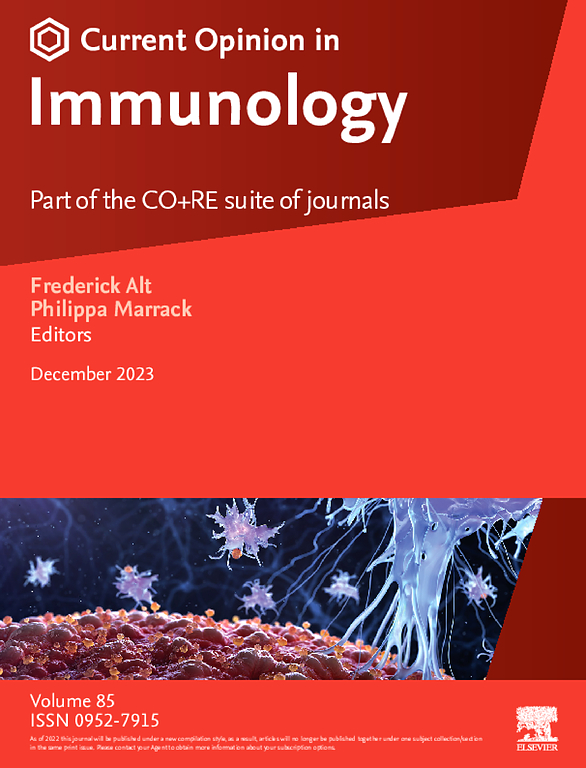检查点激动剂-免疫调节作用及其在银屑病和银屑病关节炎治疗中的意义
IF 5.8
2区 医学
Q1 IMMUNOLOGY
引用次数: 0
摘要
银屑病和银屑病关节炎是慢性自身免疫性疾病,其特征是免疫反应失调,特别是涉及Th17细胞。免疫检查点分子如程序性死亡-1 (PD-1)及其配体(PD-L1/PD-L2)对维持免疫耐受至关重要。这些通路的破坏有助于银屑病的发病机制。值得注意的是,用于癌症治疗的免疫检查点抑制剂与牛皮癣的发展或其恶化有关。这凸显了检查点通路在银屑病中的复杂作用。因此,免疫检查点激动剂可能是一种治疗策略,旨在恢复免疫平衡而不广泛的免疫抑制。临床前研究表明,PD-1激动剂可以通过增强抑制信号来减轻炎症。此外,自身免疫性疾病(如类风湿关节炎和溃疡性结肠炎)的早期临床试验表明PD-1调节在银屑病中的潜在益处。这篇综述探讨了免疫检查点激动剂在银屑病中作为一种有希望的替代传统免疫抑制剂,通过选择性地抑制致病性t细胞活性。本文章由计算机程序翻译,如有差异,请以英文原文为准。
Checkpoint agonists — immunoregulatory role and its implications in the treatment of psoriasis and psoriatic arthritis
Psoriasis and psoriatic arthritis are chronic autoimmune diseases characterized by dysregulated immune responses, particularly involving Th17 cells. Immune checkpoint molecules such as programmed death-1 (PD-1) and its ligands (PD-L1/PD-L2) are critical for maintaining immune tolerance. Disruptions in these pathways contribute to psoriatic disease pathogenesis. Notably, immune checkpoint inhibitors used in cancer therapy have been linked to the development of psoriasis or its exacerbation. This highlights the complex role of checkpoint pathways in psoriatic diseases. Thus, immune checkpoint agonists could be a therapeutic strategy aimed at restoring immune balance without widespread immunosuppression. Preclinical studies demonstrate that PD-1 agonists can mitigate inflammation by enhancing inhibitory signaling. Additionally, early-phase clinical trials in autoimmune diseases such as rheumatoid arthritis and ulcerative colitis suggest potential benefits of PD-1 modulation in psoriasis. This review explores immune checkpoint agonists in psoriatic disease as a promising alternative to conventional immunosuppressants by selectively suppressing pathogenic T-cell activity.
求助全文
通过发布文献求助,成功后即可免费获取论文全文。
去求助
来源期刊
CiteScore
13.30
自引率
1.40%
发文量
94
审稿时长
67 days
期刊介绍:
Current Opinion in Immunology aims to stimulate scientifically grounded, interdisciplinary, multi-scale debate and exchange of ideas. It contains polished, concise and timely reviews and opinions, with particular emphasis on those articles published in the past two years. In addition to describing recent trends, the authors are encouraged to give their subjective opinion of the topics discussed.
In Current Opinion in Immunology we help the reader by providing in a systematic manner: 1. The views of experts on current advances in their field in a clear and readable form. 2. Evaluations of the most interesting papers, annotated by experts, from the great wealth of original publications.
Current Opinion in Immunology will serve as an invaluable source of information for researchers, lecturers, teachers, professionals, policy makers and students.
Current Opinion in Immunology builds on Elsevier''s reputation for excellence in scientific publishing and long-standing commitment to communicating reproducible biomedical research targeted at improving human health. It is a companion to the new Gold Open Access journal Current Research in Immunology and is part of the Current Opinion and Research(CO+RE) suite of journals. All CO+RE journals leverage the Current Opinion legacy-of editorial excellence, high-impact, and global reach-to ensure they are a widely read resource that is integral to scientists'' workflow.

 求助内容:
求助内容: 应助结果提醒方式:
应助结果提醒方式:


